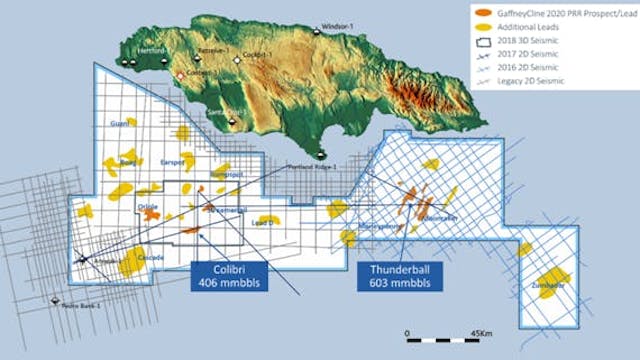1) bpTT announces first gas delivered at Mento
30May
bp Trinidad and Tobago (bpTT) said the Mento development safely delivered first gas through connection of the initial discovery well. The drilling campaign for the remaining seven gross wells on the platform will now begin.
Production from Mento will make a significant contribution towards the 250,000 barrels of oil equivalent per day (boed) combined peak net production expected from ten major projects, which bp announced earlier this year as part of its strategy to grow the upstream and are expected to start up worldwide between 2025 and 2027.
Mento is a 50/50 joint venture between operator EOG Resources Trinidad Ltd (EOG) and bpTT. The development features a 12-slot, attended facility located in acreage jointly licensed by bpTT and EOG offshore southeast Trinidad coast.
bpTT president David Campbell said he was proud to announce first gas from Mento with their partner EOG Resources Trinidad Ltd.
“For bpTT, this represents our second start up this year and it is tangible proof of the benefits of partnering with others to bring much needed gas into production. The bpTT/EOG partnership is progressing well as we continue to work on our next joint venture project Coconut.”
bpTT and EOG are currently working on the Coconut gas development under a similar joint venture arrangement. Start-up is expected in 2027.
Former energy minister Stuart Young said, “Congratulations to EOG and bpTT. Mento was a project that we negotiated and got done. Great to see first gas production.”
Former prime minister Dr Keith Rowley said, “Another egg hatched! From the boardroom in London to the TOFCO fabrication yard in La Brea, my administration worked assiduously to ensure the success of this project. Stuart Young played a critical role in the realization of this key energy sector development.”
The Mento platform was built at the TOFCO fabrication yard, La Brea, . Young and Rowley toured the platform on October 23 and November 13, 2024 respectively. TOFCO said the Mento platform was the largest single project ever built at TOFCO. The company fabricated the deck, jacket, piles and subsea spools, with a combined weight of 9,792 tons.
2) UOG reserves, development cost estimates for offshore Jamaica licence
Selection of Leads and Prospects identified on the Walton Morant Licence

The figure illustrates a selection of the leads and prospects identified across the Walton-Morant license. The 11 leads and prospects independently certified in the prospective resources report (PRR) are highlighted in orange. Courtesy United Oil & Gas plc
United Oil & Gas (UOG) has issued a technical update on the exploration potential of its Walton Morant license offshore Jamaica.
It follows the government’s recent confirmation of a two-year extension of the license until Jan. 31, 2028, giving UOG more time for the farm-out process.
Latest analysis suggests the license area may hold about 7 Bbbl of unrisked prospective resources, which could cost about $8.5/bbl to develop, if proven to be commercial.
Like the deepwater Stabroek offshore Guyana, Walton Morant’s subsurface features large structural traps with high-quality reservoir potential, UOG said.
The 22,400-sq-km block at present contains more than 40 identified leads and prospects.
It also has two distinct geological basins. The Walton basin holds various large, high-impact prospects such as Colibri (406 MMbbl), Oriole (220 MMbbl) and Streamertail (221 MMbbl).
Notable structures identified in the Morant Basin include Thunderball (603 MMbbl) and Moonraker (323 MMbbl).
UOG’s work program, currently in the planning and permitting stage, is focused on further de-risking activities via, for example, piston core sampling to enhance reservoir understanding, and reprocessing existing seismic data to better delineate prospectivity across the license
